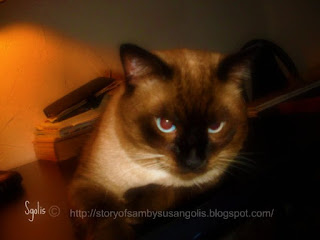My
FIV cat named Sam has been with us a long time even though when we
first rescued him his veterinarian did not think he would survive the
month. Back in 2008
Sam was a skin and bones abandoned Siamese cat that had tested positive
for Feline AIDS ad Leukemia.
Honestly
I knew nothing of these cat diseases but knew in my heart that I
needed to give Sam
a chance and that I also needed a second opinion. The attending veterinarian was adamant about Sam's dire health conditions and
strongly suggested euthanasia as it would be more humane than the
painful death my cat would endure.
It
is safe to say that in 2008 when Sam was approximately 2 years old, that this time period for knowing and understanding FIV was the “dark ages” as many cats with this condition were euthanized because veterinarians did not fully understand the feline disease.
Know that Sam
has come a long way in the past 13 years. Here are photographs of Sam throughout the years.
Sam
was retested 60 days after his first test and he did not have Feline
Leukemia he did have FIV (feline immunodeficiency virus). We
accepted this condition and were determined to provide Sam
with a happy and long life.
If
I did not tell you that Sam had FIV you would not know it from
looking at him. He put on weight and at one point I thought he had a
food addiction. He had gotten fat and we needed to reduce the
carbohydrates by cutting out the kitty snacks and feeding him pate
canned food. Sam loved all Science Diet canned foods that came with
gravy. The gravy was greatly missed but Sam
learned to like Pate.
For
the first six years Sam lived in my office far far away from my other
cats. The attending veterinarian put the fear into us by saying that
if Sam groomed one of our cats or ate out of the same bowl that our
normal cats would be infected with the incurable FIV disease.
We
were very careful with Sam but one day he got out and he charged to
the other side of the house. There he befriended our other cats and
at the end of the day, they were all best friends. Of course, we were
certain that they all had FIV but after having them all tested, none
of the cats were sick.
Yes
in the past 13 years, we were told many things, that made us think
that a slight change in the household temperature, germs, stress, or
household anxiety such as moving a chair was enough to make Sam
deathly ill. Sam survived a tornado, household chairs moving, the
vacuum, germs in the house, and stressful situations and he was a
trooper, he never got deathly ill.
At
one point I thought Sam may have been vaccinated for Feline
immunodeficiency and that the test was a false negative. So we had a
blood test done and it confirmed that Sam did have FIV.
Sam
is now age 15 and he is still a happy cat with old cat symptoms such
as arthritis in his hind legs. He sleeps more than he used to, but
he also plays with his toys and the other cats and he loves to sleep on my husband's head.
To
look at Sam you would think he was just a senior cat, you would never
know that he has lived a long life with FIV an immunodeficiency cat
disease.
The above photos were taken in the last 13 years and the below is Sam now. He is thinner, Sam is older (age 15) but he is still our happy and fun-loving fur-kid.































